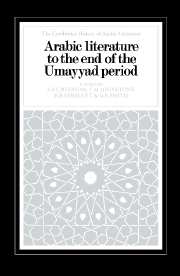Book contents
- Frontmatter
- Contents
- Editorial introduction
- 1 The tribes of pre-Islamic Arabia
- 2 The Umayyad Empire, c. A.D. 750
- 1 Background topics
- 2 Pre-Islamic poetry
- 3 Early Arabic prose
- 4 The beginnings of Arabic prose literature: the epistolary genre
- 5 The role of parallelism in Arabic prose
- 6 The Qur'ān-I
- 7 The Qur'ān–II
- 8 Qiṣaṣ elements in the Qur'ān
- 9 Aspects of the Qur'ān today
- 10 Ḥadīth literature–I: The development of the science of Ḥadīth
- 11 Ḥadīth literature-II: Collection and transmission of Ḥadīth
- 12 Shī'ī Ḥadīth
- 13 Narrative elements in the Ḥadīth literature
- 14 European criticism of Ḥadīth literature
- 15 The impact of the Qur'ān and Ḥadīth on medieval Arabic literature
- 16 The Maghāzī literature
- 17 The Sīrah literature
- 18 The poetry of the Sīrah literature
- 19 Fables and legends in pre-Islamic and early Islamic times
- 20 Umayyad poetry
- 21 Music and verse
- 22 The Greek impact on Arabic literature
- 23 The Persian impact on Arabic literature
- 24 The Syrian impact on Arabic literature
- Appendix Bibliography of translations of the Qur'ān into European languages
- Glossary
- List of sources
- Index
10 - Ḥadīth literature–I: The development of the science of Ḥadīth
Published online by Cambridge University Press: 28 May 2012
- Frontmatter
- Contents
- Editorial introduction
- 1 The tribes of pre-Islamic Arabia
- 2 The Umayyad Empire, c. A.D. 750
- 1 Background topics
- 2 Pre-Islamic poetry
- 3 Early Arabic prose
- 4 The beginnings of Arabic prose literature: the epistolary genre
- 5 The role of parallelism in Arabic prose
- 6 The Qur'ān-I
- 7 The Qur'ān–II
- 8 Qiṣaṣ elements in the Qur'ān
- 9 Aspects of the Qur'ān today
- 10 Ḥadīth literature–I: The development of the science of Ḥadīth
- 11 Ḥadīth literature-II: Collection and transmission of Ḥadīth
- 12 Shī'ī Ḥadīth
- 13 Narrative elements in the Ḥadīth literature
- 14 European criticism of Ḥadīth literature
- 15 The impact of the Qur'ān and Ḥadīth on medieval Arabic literature
- 16 The Maghāzī literature
- 17 The Sīrah literature
- 18 The poetry of the Sīrah literature
- 19 Fables and legends in pre-Islamic and early Islamic times
- 20 Umayyad poetry
- 21 Music and verse
- 22 The Greek impact on Arabic literature
- 23 The Persian impact on Arabic literature
- 24 The Syrian impact on Arabic literature
- Appendix Bibliography of translations of the Qur'ān into European languages
- Glossary
- List of sources
- Index
Summary
Ḥadīth literature is exceedingly abundant. The subject lends itself to many possibilities; and the religious value attached to the pursuit inspired scholars of all ages to take up the challenge enthusiastically. Moreover, absence of an official undertaking to compile ḥadīth, from the surviving Companions of the Prophet left the door open to uncontrolled individual initiatives, thus giving rise to numerous studies on the subject.
The collection and arrangement of the Ḥadīth, i.e. words, deeds and tacit approvals attributed to the Prophet, as well as descriptions of his person, developed through a number of stages. These are designated here as the sahīfab, musannaf, musnad, sahīh and the analytical stages.
THE AGE OF ṢAḤĪFAH (FIRST/SEVENTH AND EARLY SECOND/EIGHTH CENTURIES)
For most of the first century, there was apparently an ambivalent attitude on the part of the Companions and their early Followers (Tābi‘ūn) concerning the writing of ḥadīth,. There was both the desire to write it down for obvious benefits, and the fear that written ḥadīth, might later be confused with the Qur'ān. Nevertheless, some fifty Companions and almost as many early Followers are said to have possessed manuscripts, then called suhuf (sing, sahīfah), i.e., some material in which ḥadīth, were included.
Toward the end of the first/seventh century, however, certain factors jointly stimulated the undertaking of compiling ḥadīth, without further hesitation. Fears about the purity of the Qur'ān had subsided. The text was then memorized and uniformly recited by countless numbers of Muslims, and its copies were widely circulated. Moreover, leading ḥadīth, teachers were gradually disappearing, and corruption began to threaten its integrity.
- Type
- Chapter
- Information
- Arabic Literature to the End of the Umayyad Period , pp. 271 - 288Publisher: Cambridge University PressPrint publication year: 1983
- 5
- Cited by



